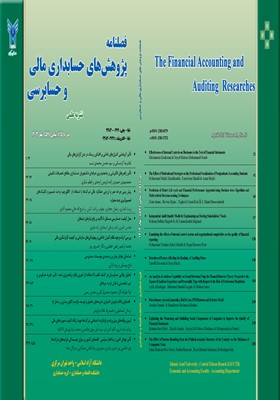مدل کیفیت حسابرسی مستقل با تأکید بر رفع نیازهای ذینفعان
محورهای موضوعی : حسابداری مالی و حسابرسی
محسن دلبری راغب
1
![]() ,
علی اسماعیل زاده
2
*
,
علی اسماعیل زاده
2
*
1 - گروه حسابداری، واحد تهران مرکزی، دانشگاه آزاد اسلامی، تهران، ایران
2 - گروه حسابداری، واحد تهران مرکزی، دانشگاه آزاد اسلامی، تهران، ایران
کلید واژه: ذینفعان, نظریهپردازی داده بنیاد, واژههای کلیدی: مدل کیفیت حسابرسی,
چکیده مقاله :
چکیده ذینفعانی که در پی کسب اطمینان نسبت به صحّت محتوای اطلاعات مالی هستند از حسابرسی مستقل بعنوان ابزاری کارآمد در حوزه کنترلهای مالی استفاده میکنند امّا غالباً، در مورد کیفیت این ابزار با ابهامات و سؤالات زیادی مواجه میشوند. در این میان، پژوهش حاضر و هدف آن که "ارائه مدل کیفیت حسابرسی مستقل با تأکید بر رفع نیازهای ذینفعان" است، میتواند ابهامات و سؤالات آنان را به میزان زیادی برطرف نماید. پژوهش حاضر کیفی، داده بنیاد (با رهیافت ظاهر شونده، حاوی پارادیم تفسیری و رویکردی استقرایی) است که براساس نمونهگیری نظری، مصاحبههای عمیقِ نیمهساختاریافته با چهارده نفر از متخصصین حسابرسی و توجهی استمراری به شاخص اقناع نظری، انجام شده است. یافته پژوهش "مدل کیفیت حسابرسی مستقل با تأکید بر رفع نیازهای ذینفعان" است. این مدل چند وجهی شامل چهار جزء مشترک و طبقهبندی سهگانه ذینفعان (حاوی یازده جزء) میباشد. اجزای مدل پژوهش دارای رابطه تعاملی با یکدیگر هستد. این رابطه وضعیتی را ایجاد میکند که هر جزء مدل، در شرایط اثرگذاری و اثرپذیری نسبت به دیگر جزء قرار میگیرد. این مدل ضمن تصدیق تئوری اخلاقی حسابرسی، دیدگاه و تصویر ذهنی مصاحبهشوندگان پژوهش از کیفیت حسابرسی مستقل با تأکید بر رفع نیازهای ذینفعان را نشان میدهد. اجرای مدل پژوهش و یا استفاده از اجزای آن، علاوه بر کمک به ذینفعان درخصوص کیفیت حسابرسی، منجر به افزایش اعتماد عمومی جامعه به اطلاعات مالی خواهد شد.
Abstract Stakeholders, who seek to ensure the accuracy of the content of financial information, use independent auditing as an effective tool in the field of financial controls but often, face many ambiguities and questions about the quality of this tool. In the meantime, the present study and its purpose, which is to "provide Independent Audit Quality Modle by Emphasizing on Meeting Stakeholders’ Needs", can largely resolve their ambiguities and questions. Method: The present qualitative research is a data foundation (with an emerging approach, containing an interpretive paradigm and an inductive approach) based on theoretical sampling, in-depth semi-structured interviews with fourteen auditors and continuous attention to the theoretical persuasion index. The research finding is "Independent Audit Quality Modle by Emphasizing on Meeting Stakeholders’ Needs". This multidimensional model includes four common components and a triple classification of stakeholders (containing eleven components). The components of the research model have an interactive relationship with each other. This relationship creates a situation in which each component of the model, is in terms of impact and effectiveness against the other component. This model, while acknowledging the ethical theory of auditing, shows the views and mental image of the interviewees of the research on the quality of independent auditing with emphasis on meeting the needs of stakeholders. The implementation of the research model or the use of its components, in addition to helping stakeholders in the quality of auditing, will increase public confidence in financial information.

